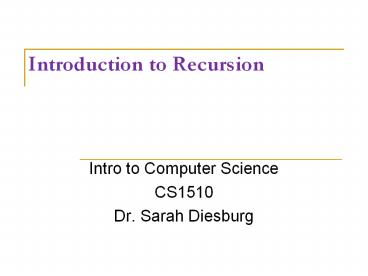Introduction to Recursion - PowerPoint PPT Presentation
Title:
Introduction to Recursion
Description:
Introduction to Recursion Intro to Computer Science CS1510 Dr. Sarah Diesburg Sorting Complexity Three sorting algorithms Bubble Sort Insertion Sort Merge Sort All ... – PowerPoint PPT presentation
Number of Views:101
Avg rating:3.0/5.0
Title: Introduction to Recursion
1
Introduction to Recursion
- Intro to Computer Science
- CS1510
- Dr. Sarah Diesburg
2
Sorting Complexity
- Three sorting algorithms
- Bubble Sort
- Insertion Sort
- Merge Sort
- All these algorithms are approximately n2
- Can we do better?
3
Sorting Programming Assignments
- Lets say I have 16 programming assignments, and
I need to sort them in alphabetical order - Im lazy, so I hand off half of the assignments
to one student to sort, and the other half to
another student to sort - How many comparisons do I have to make to merge
both sorted paper stacks?
4
Sorting Programming Assignments
- Lets say I have 16 programming assignments, and
I need to sort them in alphabetical order - Im lazy, so I hand off half of the assignments
to one student to sort, and the other half to
another student to sort - How many comparisons do I have to make to merge
both sorted paper stacks? - Worst case 1 pass, around n comparisons
5
What if everyone hands off the work?
A
16
B
C
6
What if everyone hands off the work?
A
16
B
C
8
8
D
E
F
G
7
What if everyone hands off the work?
A
16
B
C
8
8
D
E
F
G
4
4
4
4
H
2
I
1
8
What if everyone hands off the work?
How long does this take? 5 rows of 16 units of
work each 16580 Looks better than n-squared!
A
16
B
C
8
8
D
E
F
G
4
4
4
4
H
2
I
1
9
How can we build a Merge Sort?
- We need to understand a new concept called
recursion
10
A Function that Calls Itself
- The very basic meaning of a recursive function is
a function that calls itself. - However, when you first see it, it looks odd.
- Look at the recursive function that calculates
factorial (code listing 16-2).
11
Code Listing 16-2
- def factorial(n)
- """Recursive factorial."""
- if n 1
- return 1
- else
- return n factorial(n-1)
12
It Doesnt Do Anything!
- This is a common complaint when one first sees a
recursive function What exactly is it doing? It
doesnt seem to do anything! - Our goal is to understand what it means to write
a recursive function from a programmers and
computers point of view.
13
Defining a Recursive Function
14
1) Divide and Conquer
- Recursion is a natural outcome of a divide and
conquer approach to problem solving. - A recursive function defines how to break a
problem down (divide) and how to reassemble
(conquer) the sub-solutions into an overall
solution.
15
2) Base Case
- Recursion is a process not unlike loop iteration.
- You must define how long (how many iterations)
recursion will proceed until it stops. - The base case defines this limit.
- Without the base case, recursion will continue
infinitely (just like an infinite loop).
16
Simple Example
- Lao-Tzu A journey of 1000 miles begins with a
single step. - def journey (steps)
- the first step is easy (base case)
- the nth step is easy having completed the
previous n-1 steps (divide and conquer)
17
Code Listing 16-1
- def takeStep(n)
- if n 1 base case
- return "Easy"
- else
- thisStep "step(" str(n) ")
- divide step, recurse
- previousSteps takeStep(n-1)
- conquer step
- return thisStep " " previousSteps
18
Factorial
- You remember factorial?
- Factorial(4) 4! 4 3 2 1
- The result of the last step, multiply by 1, is
defined based on all the previous results that
have been calculated.
19
Code Listing 16-2
- def factorial(n)
- """Recursive factorial."""
- if n 1
- return 1
- else
- return n factorial(n-1)
20
Trace the Calls
- 4! 4 3! start first function invocation
- 3! 3! 2 start second function invocation
- 2! 2 1! start third function invocation
- 1! 1 fourth invocation, base case
- 2! 2 1 2 third invocation finishes
- 3! 3 2 6 second invocation finishes
- 4! 4 6 24 first invocation finishes
21
Another Fibonacci
- Depends on the Fibo results for the two previous
values in the sequence. - The base values are Fibo(0) 1 and Fibo(1)
1. - fibo (x) fibo(x-1) fibo(x-2)
22
Code Listing 16-3
- def fibo(n)
- """Recursive Fibonacci sequence."""
- if n 0 or n 1 base case
- return 1
- else
- divide and conquer
- return fibonacci(n-1) fibonacci(n-2)
23
Trace
- fibo(4) fibo(3) fibo(2)
- fibo(3) fibo(2) fibo(1)
- fibo(2) fibo(1) fibo(0) 2 base case
- fibo(3) 2 fibo(1) 3 base case
- fibo(4) 3 2 5































